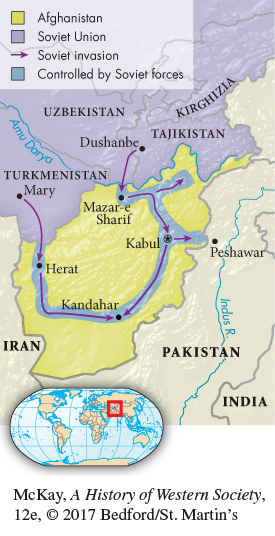A History of Western Society: Printed Page 1007
A History of Western Society, Value Edition: Printed Page 966
A History of Western Society, Concise Edition: Printed Page 1010
From Détente Back to Cold War

The Soviets and the leaders of the Soviet satellite states faced challenges from abroad as optimistic hopes for détente in international relations gradually faded in the late 1970s. Brezhnev’s Soviet Union ignored the human rights provisions of the Helsinki agreement, and East-
President Jimmy Carter (U.S. pres. 1977–1981) tried to lead NATO beyond verbal condemnation of the Soviet Union and urged economic sanctions against it, but only Great Britain among the European allies supported the American initiative. The alliance showed the same lack of concerted action when the Solidarity movement rose in Poland. Some observers concluded that NATO had lost the will to act decisively in dealing with the Soviet bloc.
The Atlantic alliance endured, however, and the U.S. military buildup launched by Carter in his last years in office was greatly accelerated by President Reagan, who was swept into office in 1980 by a wave of patriotism and economic discontent. The new American leadership acted as if the military balance had tipped in favor of the Soviet Union, which Reagan anathematized as the “evil empire.” Increasing defense spending enormously, the Reagan administration deployed short-